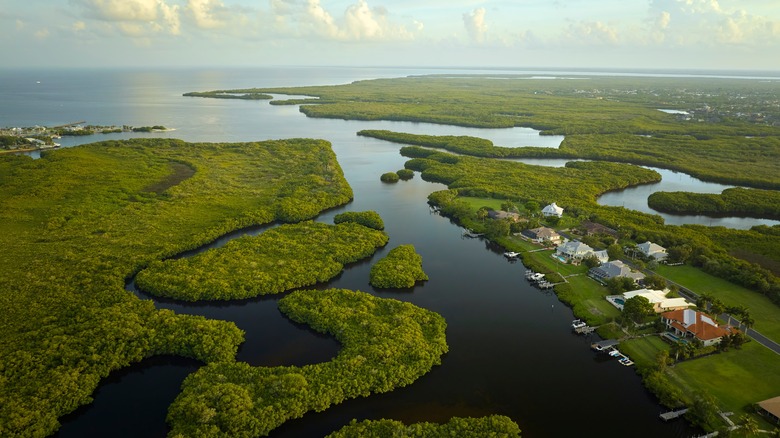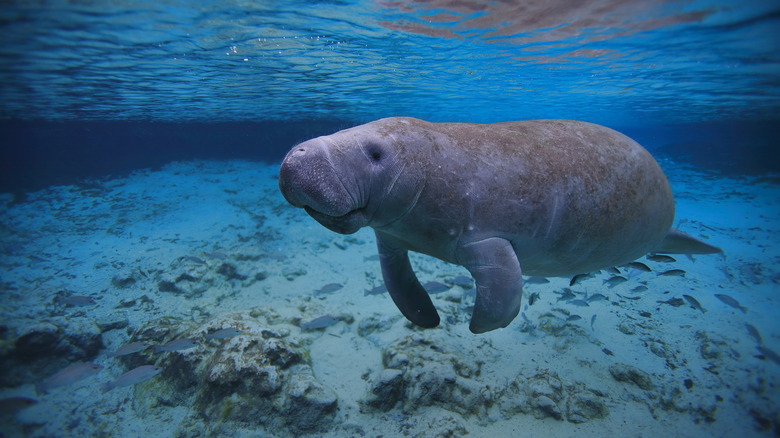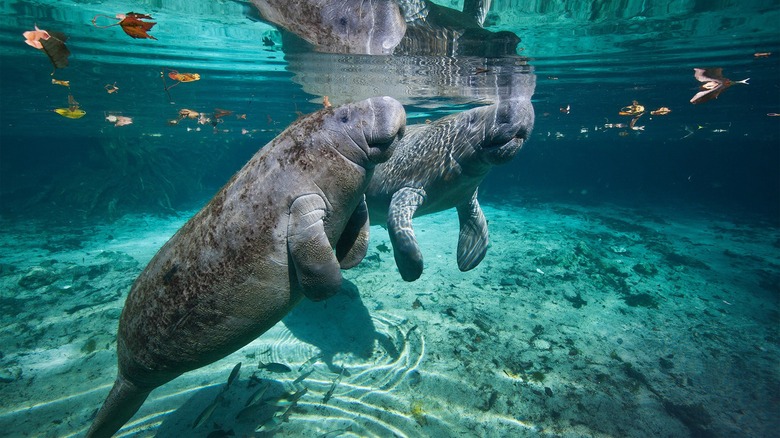Tourists Visiting Florida Will Get Hit With Fines For Breaking This Wildlife Rule
Walking along the ocean boardwalk on a warm day in Florida, a movement in the water catches your eye. A large creature surfaces from the depths below. Is it a shark? A dolphin? Its enormous size and slow movements make you wonder what sort of incredible ocean wildlife you've just caught a glimpse of? As the animal reaches the surface and lets out a blubbery breath, you notice its rounded face and bulbous nose, more like a walrus than anything else. The animal you've encountered is actually a manatee, a sea mammal that lives in the waters of Florida.
The one you've discovered seems curious and even friendly, and it may be tempting to reach out and touch its wrinkled face and round body. Think twice before you do so. While it may be appealing to see wildlife up close this way, approaching a manatee could result in a heavy fine and even time in jail.
Also known as "sea cows," manatees are docile animals who eat only seagrass and love to doze on their backs on the ocean floor. There are several types of manatees that live in different areas of the world. The Florida manatees choose to spend the chilly months of the year in the warm waters of the Sunshine State, where they often migrate to the waterways and rivers. They can grow to be 13 feet long and weigh over 3,000 pounds, but their wide, flat tails help them maneuver through the water.
Admire manatees from afar but don't interact
Because sea cows are mammals, they need to surface every 20 minutes or so to breathe. Unfortunately, these gradual ascensions are the times when manatees can run into trouble. As their wide tails propel them to the water's surface, they run the risk of being hit by boats that pass through the waterways and canals. These collisions can often be fatal to these slow-moving creatures.
Pollution and wastewater runoff into the waters of their natural habitat have also contributed to a decline in the number of sea cows who remain in the wild. As a result, these animals are classified as "threatened" by the U.S. Fish and Wildlife Service. In addition, the Florida Manatee Sanctuary Act of 1978 says that "it is unlawful for any person, at any time, intentionally or negligently, to annoy, molest, harass, or disturb any manatee." The penalty for disregarding these federal and state laws can result in a fine of up to $50,000 and possibly a year in prison.
It's important to remember that observing a manatee from a safe distance is best, but you should never pet or feed one. Give them plenty of space to maneuver safely through the water, and don't chase them. Splashing or startling the animal is also prohibited, because if a manatee is frightened, it may retreat suddenly and enter an area where it could be injured. Startling a manatee is also risky because you may accidentally separate a mother from her calf.
Manatees are special and need protection
It's also important to note any indication of a "No Entry — Manatee Refuge" area. The Florida Fish and Wildlife Conservation Commission and the U.S. Fish and Wildlife Service have created these protective barriers to ensure that manatees can thrive in their natural habitats. Another way to protect these animals is to steer boats cautiously and slowly through waterways. Watch for signs in the water that manatees are nearby, such as the "footprint" of circular swirls in the water that are caused by their tails as they swim. If you see evidence of one animal, it's possibly traveling as part of a herd. Don't pass directly over the spot where you've seen one appear, because another may surface in your boat's path.
Stopping to look at Florida's wildlife can be memorable, and catching a glimpse of a manatee is a special experience. The first person in history to record a sighting of one was Christopher Columbus. In his exploration of the New World, he caught a glimpse of these creatures with their wide tails and thought they might be the mermaids described in folklore. The truth is that manatees really are magical, with their quiet demeanor and mysterious way that they glide through the water and disappear beneath the water's surface. These gentle giants deserve to be protected so they can grace the waterways of Florida with their benevolent presence for generations to come.


